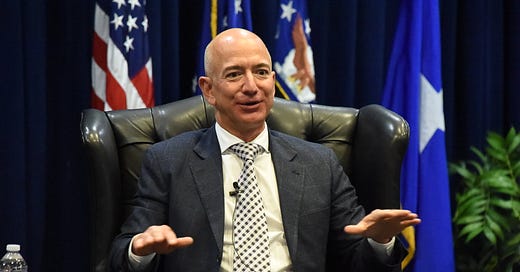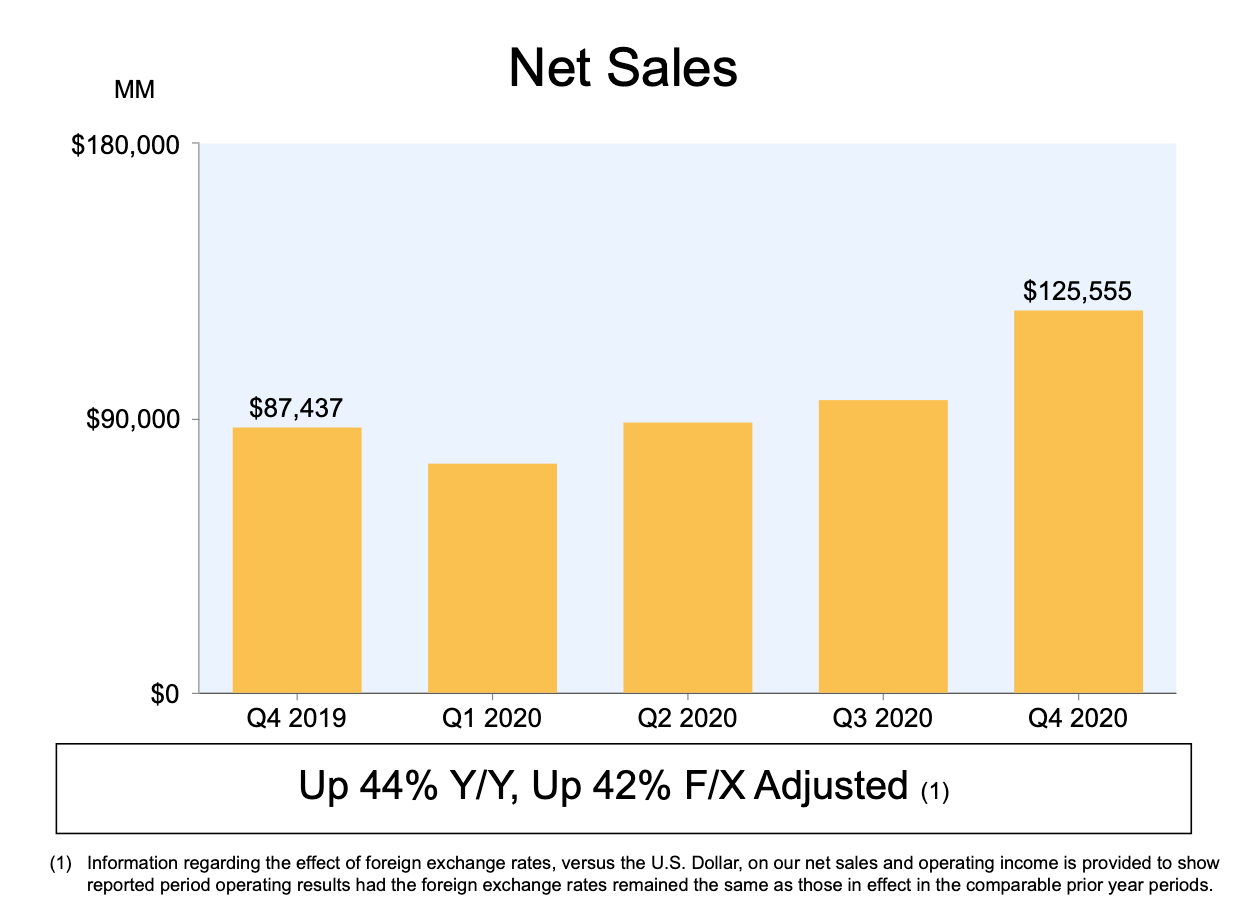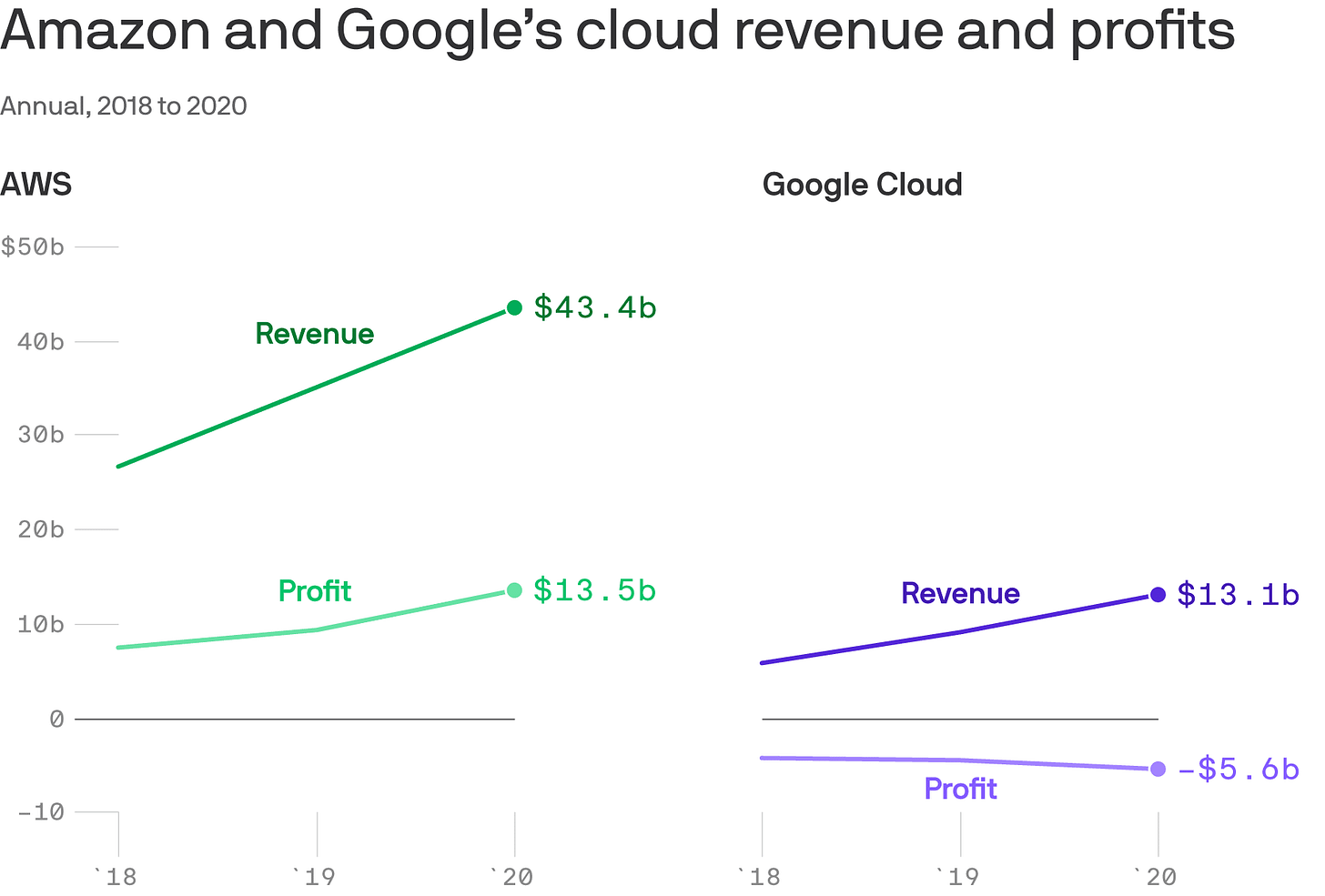👋 Welcome to FWIW by David Tvrdon, your weekly tech, media & audio digest.
In this edition
🍹 What does Jeff Bezos want to do next
📊 Q4 2020 earnings: Amazon, Alphabet, Spotify
💬 Other tech, media, gaming, audio & podcasting news
🆕 Read my regular Friday column for The Fix, this time about the future of audio: Is your newsroom producing too much content? The answer is probably yes
🤔 Paul Ostwald, the founder of Forum.eu wrote an op-ed reply to my column, it’s really thoughtful: Building pan-European media is an important challenge to be solved
What does Jeff Bezos want to do next
📸 by Los Angeles Air Force Base Space and Missile System Center
I am not going to repeat the news of Jeff Bezos leaving the CEO role to Andy Jassy, the leader of AWS, in Q3 this year. Nor am I going to write about Andy Jassy, there are already really good profiles out there, like this one from The Wall Street Journal, this op-ed from The New York Times, or this long-form from The Verge.
Also, you can read how even people who left very publicly from Amazon with a bang say Jassy is a great executive.
Or, even better, watch Jassy in this interview and you will get a pretty good picture of who he is and how he reacts to journalist’s questions:
What has Jeff Bezos built
Ok, let’s go back to Bezos. Over the past few days I have read many pieces in the media, on Twitter or watched on YouTube, and almost universally those voices, counting all the good and bad, have said Bezos will be remembered as one of the best and most accomplished CEO in the history of business. High praise.
Looking at the facts, it’s hard to dispute such statements. Bezos has built Amazon from scratch, from just a simple idea - the internet is growing exponentially, how can I take advantage of that.
Ben Thompson wrote a really good piece on the legacy of Bezos, and also reminded us how he was thinking at the time when Amazon began.
What is clear, though, is that any attempt to understand the relentlessness of the company redirects to their founder, Jeff Bezos, who announced plans to step down as CEO after leading the company for twenty-seven years. He is arguably the greatest CEO in tech history, in large part because he created three massive businesses, all of which generate enormous consumer surplus and enjoy impregnable moats: Amazon.com, AWS, and the Amazon platform (this is a grab-all term for the Amazon Marketplace and Fulfillment offerings; it is lumped in with Amazon.com in the company’s reporting). These three businesses are the result of Bezos’ rare combination of strategic thinking, boldness, and drive, and the real world manifestations of Amazon’s three most important tactics: leverage the Internet, win with scale, and being your first best — but not only — customer.
What’s next for Bezos?
Steven Levy, the notorious Silicon Valley chronicler, explained what’s next for Jeff Bezos and why he does not want to be CEO anymore:
As executive chair focusing on long-term projects, Bezos will work on more new initiatives to integrate into this process. But as he noted in his letter to employees, he will now also be able to spend more time on projects outside the flywheel, like his nonprofits (the Day One Fund and the Bezos Earth Fund), The Washington Post, and Blue Origin, which he told me was his most important project of all.
Bezos, 57 years old, does not want to spend time defending Amazon’s flywheel to senators. To use his own words from that summer conversation: I’m just not going to. I don’t need to.
One of the world’s most richest people simply wants to tend to his passions and not to spend time facing hard questions regarding Big Tech regulations. I dno’t blame him, also, I do not envy the new CEO, in some respects, the hardest for Amazon is about to come.
👉 Be sure to subscribe if you were forwarded this newsletter.
📊 Q4 2020
🛒 Amazon delivered its largest quarter by revenue of all time at $125.56 billion, pushing it past the symbolic $100 billion marks for the first time. [CNBC]
🔍 Alphabet had a good quarter. Google’s parent company reported revenue of $57B (up 23% YoY), and a profit of $15B (up 43% YoY). Alphabet also broke out Google Cloud results for the first time with a $5,6B yearly loss. [CNBC]
🎧 Spotify missed quarterly revenue expectations. The net loss attributable to Spotify was 356 million euros, compared with 76 million a year earlier. [CNBC]
🚗 Again those Apple car rumors. This time though it seems things are moving in a direction that might end up with Kia-Hyundai starting to produce cars for the iPhone maker in 2024. Will see. [Bloomberg]
👋 Clubhouse is a haven for free speech in China. At least until the government shuts it down just like other American social media sites. [Nikkei Asia]
📩 Substack cofounder welcomed Facebook and Twitter to the newsletter game. Not gonna comment, just a question: Do you remember how Slack’s CEO wrote a similar letter to Microsoft welcoming Teams and then ended up suing Microsoft… [Substack blog]
🚘 Nio (“the Chinese Tesla”) deliveries in January quadruple from a year ago, signaling a strong start to 2021. [CNBC]
😯 Banning Trump didn't change how much people use Twitter. New data shows Trump’s presence on Twitter had no impact on how much people used it, contrary to the popular narrative. [Big Technology]
📱 People are furious with Robinhood but they keep downloading it. Downloads of the commission-free investment app remain high after a record week. [Vox]
🛎️ He helped popularize the term “attention economy” and in the mid-1980s predicted most of what is happening today. An interesting profile of a former theoretical physicist. [NY Times]
📵 Huawei and other Chinese companies will remain on a restricted trade list. President Joe Biden’s nominee for Commerce secretary, Gina Raimondo, said she knows of “no reason” why they shouldn’t remain on it. [Bloomberg]
👴🏻 Countries are tackling the digital divide as they ask seniors to register for vaccination online. [MIT Technology Review]
🤦♂️ The ups and downs of citizen journalism and media democratization. Read these two parts of Jessica Lessin’s take on the issue that has been around and is finding a way into discourse again thanks to the ascendence of Clubhouse and others: The Nightmare Awaiting the News Industry & What Critics of the News Industry Get Right—and Wrong.
📈 The New York Times tops 7.5 M subscriptions as ads decline. In its fourth-quarter earnings report, The New York Times Company said 2020 was its biggest year for adding subscribers. [NY Times]
📺 Apple TV+ is doing better than you think. Not many shows on the service, but those few are earning critical praise, some are reminded of how AMC started. [Vulture]
🇨🇳 Experts warn of China's growing media influence in Africa China is rapidly accelerating its presence in Africa's media landscape. The Chinese state-run Xinhua News Agency is boasting the largest correspondent network on the continent. [DW]
Chinese investment in Kenya's media industry has created 500 jobs — up to 300 of those are journalists on television and radio. They have also introduced state-of-the-art technology and trained many budding journalists.
⚫ Internet blackouts skyrocket amid global political unrest. [Axios]


🎧 Clubhouse is creating an entirely new space in digital audio to serve different needs than podcasting. [Pacific Content Blog]
Clubhouse and podcasting (mostly) serve entirely different purposes. Clubhouse is primarily being framed as “social audio,” which, by definition of the way they are distributed, is not possible for podcasts.
Podcasts are on-demand shows, in the same way that Netflix, Prime Video, and Hulu let you consume the shows you want on your own schedule. The most successful shows are very well-produced. They are often edited to increase quality. Many have narrative-based formats. They offer the possibility of rich sound design that creates scenes and emotions in your mind. I know there are many exceptions and that there are a LOT of unedited talk podcasts, but…
Clubhouse, so far, has none of those attributes. None.
📈 The New York Times made $36M in podcast ad revenue in 2020, up $7M from the prior year. [NYT CO.]
🎙️ Spotify said during earnings call that they are confident that podcast usage has been a factor in the accelerated net additions. [Spotify Investors]
🤑 Sounds Profitable, Bryan Barletta’s podcast adtech weekly from Podnews, now has a podcast. You can subscribe here. [Sounds Profitable]
😮 Trouble at Google Stadia. Google will close its two game studios, the company plans to begin offering its Stadia tech to publishers, opening up the possibility for Stadia to become the streaming tech for other video game companies. [Kotaku]
🎮 Nintendo sold 24M Switch consoles during the three quarters through December. After this fourth year of holiday season Switch sales, cumulative sales total 74 million consoles, Nintendo said. [AP News]
📈 Sony sold 4.5M PlayStation 5 consoles last year. The PS4 also shipped 4.5M units in its launch quarter. [The Verge]
🕹️ Amazon’s next CEO says he’s committed to making video games. Andy Jassy told staff he sees a bright future ahead. [Bloomberg]
🌆 Superstar cities are in trouble. The past year has offered a glimpse of the nowhere-everywhere future of work, and it isn’t optimistic for big cities. [The Atlantic]
❄️ From Quartz’s Daily Brief: Scotland gives its snowplows the best names. You can track the gritters like “I Want to Break Freeze” and “Veruca Salt” in real-time.
Catch me on Twitter or LinkedIn. Was this forwarded to you? 👉 Subscribe over here.
















